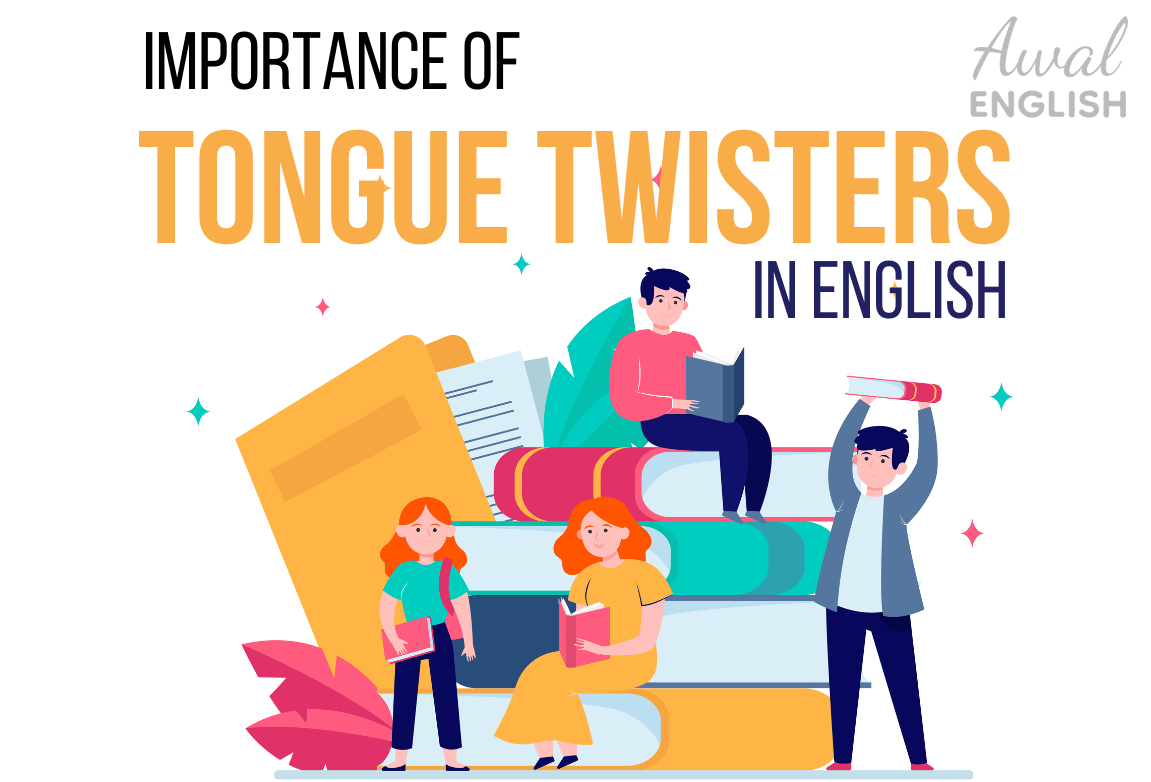
If you are having any kind of trouble saying this English tongue twister, then you need to realize that you are not alone here. Pronouncing the tongue twisters can be difficult for native speakers as well. The Tongue twisters are a sequence of words or sounds that are usually alliterative. This means that the first consonant is repeated and this is difficult to pronounce quickly and correctly. Tongue twisters are quite funny.
Examples of Tongue twisters
Some of the most common examples of tongue twisters are:
- Whether the weather is fine or whether the weather is no, whether the weather is cold or whether the weather is hot, we’ll weather the weather, whatever the weather, whether we like it or not.
- Toy boat, toy boat, toy boat.
- Loopy lizards lying lazily aloft a little lane of logs.
- If two witches were watching two watches, which witch would watch which watch?
- Swan swam over the sea, swim, swan, swim! Swan swam back again well swum, swan!
- Rubber baby buggy bumpers.
- I thought a thought but the thought I thought, wasn’t the thought you thought I thought.
- Fresh, fried, fish, fish, fresh, fried, fried, fish, fresh.
- A skunk sat on a stump and thunk the stump stunk but the stump thunk the skunk stunk.
- How can a clam cram in a clean cream can?
How to learn tongue twisters?
To learn the tongue twisters, the first thing that you need to do is to start reading the sentence slowly. You must pronounce the beginning and end of each word strongly. After that, you will have to start saying them faster and faster, but you will have to continue the words as clearly as possible. You should try watching yourself in a mirror, too. If you make a mistake, start all over again. Now that you know how useful they are. All that you need to do is to start practising them.
Types of Tongue Twisters
There are two types of tongue twisters and these are:
Homographs
These have the same spelling but might sound similar or a little different depending on other variables. For example, the word, “Tear” is a verb which means to rip something apart and the word “tear” also means the droplets that have been discharged from the eyes of someone who is in pain.
Homophones
These sound almost identical there might be differences in spelling or the usage of the words. “There,” “There” and “They’re”. All these sound almost identical when pronounced but “their” is a possessive pronoun that indicates something that belongs to some unidentified group, on the other hand, “there” means indicating a place that is unspecified and “They’re” is made out of “they” which is the third person plural pronoun and “are” is the regular auxiliary verb that goes after “they”, when joined together.
Why do we face problems when pronouncing tongue twisters?
Tongue twisters trick the brain. This is because it is a very difficult process for the brain cells to tackle such similar-sounding sounds in the same rhyme one after the other. If there are so many words rhyming one after another, they tend to confuse the brain. It is during this time that it starts making false claims. These common situations occur at a time when the brain feels that it needs to slow down. This is because it needs time to comprehend and the brain even more time to process confusing information. On the other hand, a tongue twister needs to be said very quickly and without making any mistakes or stops at the time of the pronunciation.
English is one of the toughest languages to deal with and therefore, and therefore, it is quite difficult for English learners. But when these homographs and homophones are used multiple times within the same sentence or they are used one after another, anybody is bound to make mistakes and brains tend to get tricked.
How the tongue twisters can benefit kids?
These tongue twisters are quite beneficial for the kids and to know about these in detail, you can go through the points mentioned below:
- Tongue twisters are recommended for children by experts to activate their brain muscles. This helps them to pronounce words and sounds. So, tongue twisters can surely help in improving pronunciation.
- Tongue twisters are wonderful when you want to introduce different consonant sounds to your pre-schooler
- It helps in stretching the facial muscles, which in turn helps children develop clear speech.
- These confusing words are quite fun. Your child can read them too. This will help them to improve their reading skills.
- This is one of the cleverest ways that will help you to improve the pronunciation of your child.
- If your child stutters or has a lisp while speaking, you should try practising tongue twisters with them. This will help them to develop a clear speech.
- When you are reciting tongue twisters, you should be able to explain the meaning of the words and how one word can have several meanings to your child. This will help in expanding the child’s vocabulary.
How to introduce tongue twisters to your kids?
To introduce the tongue twisters to your kids, you should follow the steps mentioned below:
- You will first have to tell the child to start reciting the tongue twisters at a slow pace. They have to continue doing this till they can recite all the sentences.
- The next step is to know the tongue twister by heart. This will stimulate their memory.
- The child should repeat the tongue twister as quickly as possible till the time they master it and can recite it three times in a row without making any mistakes.
- When the child has mastered one tongue twister, they can start again with another.
Fun tongue twisters to practice with kids:
From the age of 2, it is possible to encourage children to recite simple tongue twisters. At this stage, the child is in the process of acquiring phonemes and, therefore, it is quite normal that they will not be able to pronounce many syllables correctly. But the tongue twisters, as well as the poems that are rich in alliteration, can help in this process of speech development.
Here are some of the tongue twisters that are favourites among children:
Easy level
- Sheep should sleep in a shed.
- She sees cheese.
- Red lorry, yellow lorry.
- The blue bluebird blinks.
- Lucky rabbits like to cause a ruckus.
- Greek grapes, Greek grapes, Greek grapes.
- Four fine fresh fish for you.
- Zebras zig and zebras zag.
- He threw three balls.
- Cooks cook cupcakes quickly.
Middle level
- I saw a saw that could see out any other saw I ever saw.
- Chester cheetah chewed a chunk of cheap cheddar cheese.
- I slit the sheet, the sheet I slit, and the slitted sheet I sit.
- Betty and Bob brought back blue balloons from the big bazaar.
- Nine nice night nurses nursing nicely A skunk sat on a stump and thunk the stump stunk, but the stump thunk the skunk stunk.
- Lesser leather never weathered wetter weather better
- Any noise annoys an oyster, but a noisy noise annoys an oyster more.
- Four furious friends fought for the phone.
- We surely shall see the sun shine soon.
Difficult level
- Two tried and true tridents, two tried and true tridents, two tried and true tridents
- How much wood would a woodchuck chuck if a woodchuck could chuck wood? He would chuck, he would, as much as he could, and chuck as much wood as a woodchuck would if a woodchuck could chuck wood.
- Red lorry, yellow lorry, red lorry, yellow lorry, red lorry, yellow lorry
- Can you can a canned can into an uncanned can like a canner can a canned can into an un-canned can?
- If two witches were watching two watches: which witch would watch which watch?
- Peter Piper picked a peck of pickled peppers. Did Peter Piper pick a peck of pickled peppers? If Peter Piper picked a peck of pickled peppers, where’s the peck of pickled peppers Peter Piper picked?
- When a doctor doctors a doctor, does the doctor doing the doctoring doctor as the doctor being doctored want to be doctored or does the doctor doing the doctoring doctor as he wants to doctor?
- If you must cross a course cross cow across a crowded cow crossing, cross the cross coarse cow across the crowded cow crossing carefully.
- Any noise annoys an oyster but a noisy noise annoys an oyster more.
- If you notice this notice, you will notice that this notice is not worth noticing.
Reasons why the brain struggles to tell these tongue twisters
There are three types of consonants depending on if the sounds are made by the front of the tongue (i.e. “sa” and “sha”) or the back of the tongue (i.e. ga) or by the mouth (i.e. “ma”).
The vowel sounds can be split into two categories – vowel sounds that are made by opening the mouth (i.e. “o”) and vowel sounds that are made by shaping your mouth differently from that (i.e. “a,” “e,” “i” and “u”).
The point of the matter is that these types of consonants and vowel sounds are controlled by very distinct parts of the brain. In the case of a tongue twister, the brain does not confuse vowel sounds with consonant ones. It rather struggles to tell two consonant sounds apart. This is just because they are articulated from very close sections of the vocal tract although they are controlled by faraway portions of the brain.
For example, the sounds, “sa” and “sha” sounds are controlled by the same part of the brain but when saying, “Molly sells sea shells on the seashore” aloud, is comparatively much easier than saying, “Sally sells sea shells on the sea shore.” The main purpose of studying how the brain processes tongue twisters are to understand how exactly the motor section of the brain works.
Benefits of tongue twisters
There are several benefits of tongue twisters and to know about those, you can go through the discussion below:
-
Tongue twisters strengthen and stretch the muscles that are involved in speech
This muscle exercise leads to much clearer pronunciation and clearer speech patterns, and also helps in rectifying some of the most difficult sounds. They are also quite fun. These make learning pronunciation much more enjoyable than would otherwise be quite frustrating.
-
You can find out which sounds are easier
Depending on your native language and your strengths and weaknesses, some sounds will be more difficult for you to pronounce in comparison to others. Tongue twisters can highlight which are the sounds that you are struggling with. There are also chances that you might get stuck on the same sound repeatedly. This is a sign that will tell you that you need to focus on a particular sound.
Moreover, you might already be aware of certain sounds that are challenging for you. For example, Korean and Japanese speakers, tend to have difficulty with the l and r sounds. So, you already know that you should work on these sounds.
-
These tongue twisters are a great warm-up
Even if you’re a native speaker or you’ve mastered English pronunciation, tongue twisters are a great warm-up exercise before you make a presentation, speak in a public forum, teach a class, lead a meeting, act, and do any other thing.
Conclusion
The tongue twisters you with your pronunciation and speaking. They are a type of diction or articulation exercise that helps you to speak English. It is said that the brain coordinates its articulation of words according to which the muscles need to move. Therefore, the sounds that use the same or similar muscles as in tongue twisters, can seem confusing to the brain. The tongue twisters start with the same letter and therefore, it is always difficult to pronounce these. Many parents use tongue twisters as a way to entertain their children.





0 responses on "Importance of Tongue Twisters in English"